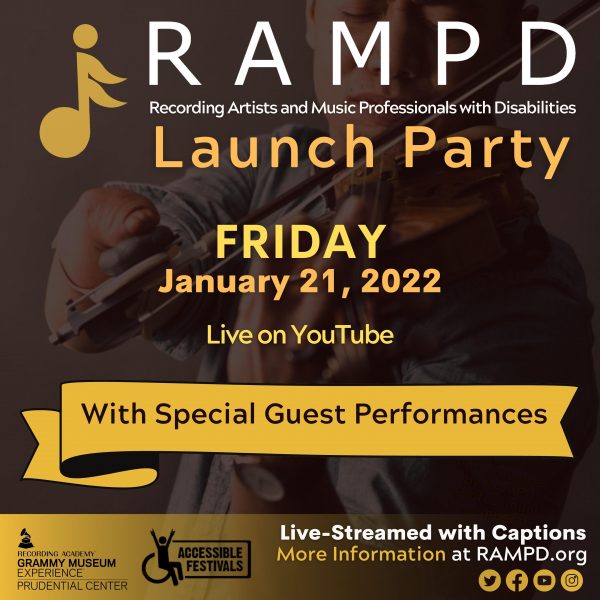This past fall, we learned from our friend, disabled musician and winner of the 2016 Tiny Desk Contest, Gaelynn Lea, about an exciting advocacy group she helped to launch. Recording Artists and Music Professionals with Disabilities—RAMPD, for short—is a collective of musicians who, like Gaelynn, are committed to making the music industry more inclusive and accessible for artists with disabilities. Through this, they hope to expand opportunities, remove barriers that impede people with disabilities from pursuing careers in music, and amplify Disability Culture.
We corresponded with Question, recording artist and one of RAMPD’s founding members, to learn more about the origins of this important organization and what people with and without disabilities can do to push the music industry forward. Read more below and be sure to join RAMPD this Friday, January 21 at 5 PM ET for their Official Launch Party, which will stream live on YouTube (see video below).
First off, awesome acronym! Can you start by giving us an overview of RAMPD, and how it came to be?
RAMPD (Recording Artists & Music Professionals with Disabilities) is a music industry-oriented collective founded with the goal of shedding light on disability culture, inclusion, and access. RAMPD was founded mid-2021 by award-winning Recording Artist Lachi based in NY after a panel she spoke on alongside members of the Recording Academy.
I love that part of your mission is “amplifying Disability Culture,” which I think is so important because a lot of people, especially those from outside the Disability Community, don’t even recognize us as a social group, much less one with a thriving culture. So, how do you define Disability Culture, and how do you amplify it?
It’s a culture made up of people who identify as having a disability who strive to progress through challenges. I amplify Disability Culture by pointing out the similarities with other subcultures and demonstrating we are capable of achieving equal forms of success.
Here is RAMPD’s “official” definition of Disability Culture: Disability Culture is a celebration of people who identify as disabled, while acknowledging the vast diversity of the disability experience and each person’s inherent and equal worth. It is unapologetic, creative, innovative, adaptable, imaginative, and rooted in problem-solving. It is based on the premise that disability needs to be seen, respected, included and celebrated. It includes our worldviews, our perspectives, our contributions, our art, our words, and our music. Disability Culture, at least in part, is a vibrant and thriving counter-response to the exclusion, marginalization, and oppression historically and currently experienced by many disabled individuals.
What in your view are the biggest obstacles facing musicians with disabilities today?
- Accessibility: Companies and content creators don’t have people with disabilities in mind when creating their products and instead consider us as an afterthought leading to us having to create our own methods to interface with products.
- Awareness: Lots of companies aren’t gathering data and marketing towards people with disabilities which is an overwhelmingly large group. Companies underestimate our capabilities and buying power.
- Inclusion: Because many people aren’t aware of how many disabled artists are in the industry, we are often not included in opportunities.
What resources and opportunities does RAMPD provide?
RAMPD has a growing online database of esteemed music artists and professionals. This resource is available for the industry to aid in awareness and to recruit talent.
If musicians with disabilities want to get involved with the organization, what is the best way for them to do so? Where can people learn more?
We are active on social media and becoming more so as we grow. Follow us on social media and at www.rampd.org. Here are all our links: 
How can folks without disabilities, both in the music industry and beyond, support the mission of RAMPD and be better allies to musicians and music goers who identify as disabled?
We super encourage and appreciate allies and their support because there is power in numbers. Allies can visit our website to take our survey to sign up for our newsletter to stay aware of events and future opportunities.
